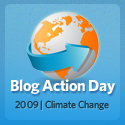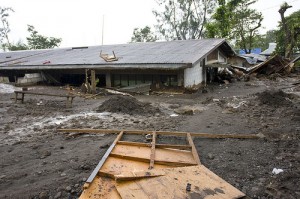 More than 9000 bloggers are devoting a post to climate change today as part of Blog Action Day, an annual initiative started by Change.org to unite the world's bloggers in reaching their millions of readers.
More than 9000 bloggers are devoting a post to climate change today as part of Blog Action Day, an annual initiative started by Change.org to unite the world's bloggers in reaching their millions of readers.
Register your blog to add your voice!
This is the Global Voices entry.
Over the next couple of months Global Voices is going to be following environmental and climate change issues extra closely. We're hoping to amplify unheard voices in the debate around the United Nations meetings in Copenhagen in December (COP15).
In November, on Conversations for a Better World, a blog sponsored by the UNFPA, two of our authors, Eduardo and Belen, are going to be cross-posting stories about population dynamics and climate change. I know they'll be looking towards Latin America.
Throughout October, Global Voices bloggers have been mentoring 31 young men and women from Africa and Denmark who are organizing an online campaign under the auspices of MS ActionAid in Copenhagen, Denmark. They've asked us to relay stories about ‘what developing countries need to help correct damage from climate change’. So we'll try to do that too.
Some mentor entries
For Blog Action Day, Jillian encouraged her readers to visit the blog of her mentee Edith, while Ali says his mentee Peter turned the tables on him and inspired him to write a post on climate change.
Another mentor, Gayle, has written a longer post highlighting the situations of farmers in Ghana, Australia (her own countries) and Zimbabwe (her mentee John‘s country).
Gayle used Twitter to put the call out for farmers in Australia. To her surprise, she was re-tweeted by ABC Radio in Australia, and came directly in touch with several farmers by email. She read interviews with Ghanaian farmers online, and even spoke to one directly.
And among dozens of links and interesting sources, Gayle found information on how local communities use traditional knowledge in rural Ghana to cope with climate change.
Gayle did something that bloggers on Global Voices do all the time. She went looking for voices you rarely hear speaking for themselves in international mainstream media.
In the past week on Global Voices
Bhumika Ghimire wrote a post today about the future of bio-gas in Nepal, including a video by a Japanese university research team that shows how bio-gas is used in rural Nepal.

A landslide caused by Typhoon Ketsana in a village in Pampanga province. Photo by Flickr user susancorpuz90
Earlier this week, Mong Palatino wrote about how Filipino bloggers are drawing connections between climate change and the devastating floods in Manila that killed more than 500 people.
Saffah Farooq wrote about how citizens of the low-lying Indian Ocean island state of the Maldives, feel their fate may be decided by the success of treaties like the Kyoto Protocol.
Wildlife blogger Samuel Maina in Kenya, wrote about how Kenyans are so desperate for rain they are awaiting El Niño rains that may displace thousands with mixed feelings.
There is a constant flow of stories on Global Voices’ environment topic feed by bloggers all around the world.
Looking ahead
On this Blog Action Day, where we celebrate the collective power of bloggers to push for change, we'd like to encourage everyone not only to write about climate change but also to read what other people are saying.
Over the next many weeks, we're going to be overwhelmed by news stories by journalists quoting politicians, activists, and many others – but when the UN meetings are over and the cameras are off, the people who face the consequences of climate change immediately, will still be telling their stories on the internet in hopes of reaching people who care.
As we say at Global Voices, ‘The world is talking. Are you listening?’
For those far removed from the front lines of climate change, listening and linking is one the few ways we can succeed to make the problem feel real and in need of solutions today.
Related posts
- Blog Action Day 2009: Rising Voices Projects Discuss Climate Change
- Posts in Portuguese on Blog Action Day ‘09
- Greek Posts on Blog Action Day ‘09
- Africa discusses climate change
- Caribbean: Blogging About Climate Change
- Israel: Blog Action Day for the Environment
- Morocco: Blogoma participates in Blog Action Day
- Ghana: Blog Action Day '09
- Global Health: Can Condoms Combat Climate Change?







19 comments
Thank you Solana! This is action through social media. I’m going to start linking now. What a day that was. But I want it to impact on an ongoing basis and will do a regular post on my own blog about this neck of the woods so that those voices will keep being heard.
Whatever the cause of our changing weather patterns, it’s not due to fossil-fuel burning because to be responsible for increasing the level of CO2 in the atmosphere, humans would have to produce more CO2 than is consumed by the organic growth taking place world-wide. Burning a ton of oil puts about three tons of CO2 into the atmosphere. Growing a ton of vegetables removes about 3 tons of CO2 from the atmosphere. Can everyone understand this?
Since organic growth produces about 150 billion tons of biomass every year, this represents the removal of about 450 billion tons of CO2 from the atmosphere by photosynthesis. Of course, 90% the biomass breaks down again, causing CO2 to return to the atmosphere again but about 10% doesn’t return to the atmosphere and can be regarded as being permanently removed from the carbon cycle. (Waste put into landfill alone accounts for 9 billion tons of CO2 equivalent). That amounts to 45 billion tons of CO2 permanently removed from the atmosphere. For our part, we put back only 29 billion tons of CO2 through burning fossil fuels. (According to the US Energy Information Administration stats). That indicates a shortfall of 16 billion tons of CO2 in the atmosphere every year. That explains why there is so little CO2 left in the atmosphere.
In the run up to the Copenhagen climate change conference, it is vital the following information be disseminated to the public as well as to our political leaders.
A widely cited 2006 report by the United Nations Food and Agriculture Organization, Livestock’s Long Shadow, estimates that 18 percent of annual worldwide greenhouse gas (GHG) emissions are attributable to livestock….however recent analysis by Goodland and Anhang co-authors of “Livestock and Climate Change” in the latest issue of World Watch magazine found that livestock and their byproducts actually account for at least 32.6 billion tons of carbon dioxide per year, or 51 percent of annual worldwide GHG emissions!
http://www.51percent.org
The main sources of GHGs from animal agriculture are: (1) Deforestation of the rainforests to grow feed for livestock. (2) Methane from manure waste. – Methane is 72 times more potent as a global warming gas than CO2 (3) Refrigeration and transport of meat around the world. (4) Raising, processing and slaughtering of the animal.
Meat production also uses a massive amount of water and other resources which would be better used to feed the world’s hungry and provide water to those in need.
Based on their research, Goodland and Anhang conclude that replacing livestock products with soy-based and other alternatives would be the best strategy for reversing climate change. They say “This approach would have far more rapid effects on GHG emissions and their atmospheric concentrations-and thus on the rate the climate is warming-than actions to replace fossil fuels with renewable energy.”
The fact is that we are being informed of the dangerous path we are on by depending greatly on animal flesh for human consumption. We still have the opportunity to make the most effective steps in saving ourselves and this planet. By simply choosing a plant based diet we can reduce our carbon foot print by a huge amount.
We are gambling with our lives and with those of our future generations to come. It’s madness to know we are fully aware of the possible consequences but yet are failing to act.
Promoting a plant based diet to the public is would be the most effective way to curb deforestation, we hope this will be adopted as a significant measure to save the rainforests and protect the delicate ecology.
Thank you for your consideration.